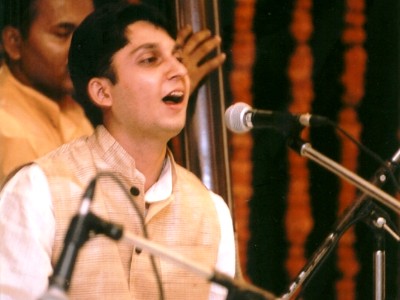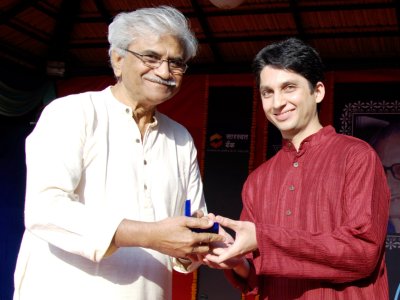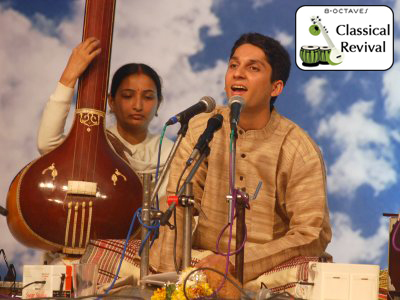Starting his musical education at 4, Pushkar Lele is a force to be reckoned with. With distinct self-assurance, he talks to Eight Octaves about his life in music.
Eight Octaves: Tell us about your early days. How did you start off?
Pushkar: I started learning music around the age of 4 even before I knew how to read and write! So music was the first language I learnt! My aunt, Manda Modak, had given me a small toy harmonium. I used to play the National Anthem and nursery rhymes on it. Seeing the precise way I used to play it, my mother realized that her child is musically gifted. A music teacher named Medha Gandhe used to come to teach my sister and I soon joined her. Due to sharp intellect and tremendous grasping, I soon overtook her and exhausted the teacher’s material in a small period of time. That’s when my mother thought that I needed a good foundation in classical music. Having musically inclined parents helped me begin my musical journey early. Had I been born to a father who was an embodiment of Aurangzeb and a mother who could not distinguish between the voices of Lata and Saigal, I would have had it!! Thank God for small favours!
Eight Octaves: Who would be your biggest influences in music and in life?
Pushkar: If one looks at the right places, there is no dearth of inspiring people. Different people have influenced and inspired me, not just in music, but as a human being and they continue to do so, the list of them being quite exhaustive! Dr. Arawind Thatte, Pt. Malini bai Rajurkar, Pt. Kumar Gandharva, Pt. Ulhas Kashalkar and many others are musicians I have genuine respect for.
Eight Octaves: What was it like working with the Guru of Gwalior gharana: Pt.
Pushkar: I was indeed lucky to have had the opportunity to have Pt. Gangadharbua Pimpalkhare as my first GURU. I shudder to think of the consequences had I joined some of the few institutionalized musical bodies instead! Initially he was very reluctant to have such a small boy his disciple. But after he heard me sing, his eyes moistened and he declared that I am to go nowhere else and that he himself will train me. I was with him for eight long years. It is thanks to him that my foundation in classical music became rock solid.
Eight Octaves: What are your favourite genres of music?
Pushkar: I do enjoy other music-s of the world. Jazz, Western Classical, Pop, Rock, Fusion and even Bollywood for that matter!
Eight Octaves: Did you balance work and college? Engineering is quite demanding.
Pushkar: I am an engineering drop out! The decision of leaving engineering to take up music full time was a difficult one and a turning point in my life. It took me some time to figure out that I am not born to become another run-of-the-mill engineer and am destined for something more sublime. Many people advised me against it then. But I had decided to listen to only one voice, my own voice within. Artistes have to be crazy to an extent to be able to achieve something in life. So that was a crazy decision, which I now can say has paid off! But this would not have been possible again without the support of my mother. She is my rock of Gibraltar! My father was a cancer patient and almost on the death bed then and to allow one’s only son to leave an engineering course to pursue music needs a lot of grit and an evolved soul.
Eight Octaves: How did you come up with the idea for the Gandhaar School of Music?
Pushkar: I personally feel that there is a GURU in every disciple and a disciple in every GURU. It is the proportion of these factors that varies from person to person. Teaching has made me grow as a GURU and has been a learning experience!
What one sees today is more or less two extremes when it comes to music teaching and learning. On the one extreme one has scores of private institutions and smaller ones affiliated to bigger institutions and on the other there are universities. These are extremes in terms of both content and method. While the former offers an overtly simplistic approach and a rigid curriculum, the latter tends to become too theoretical and esoteric.
There is a great need to find or initiate institutions that offer an alternative to these extremes. These newly found institutions have a role to play in creating well rounded students who are open, inquisitive, critical and are able to take a comprehensive and inter-disciplinary approach to music.
The ‘Gandhaar School of Music’ is a step in this direction. The school is based on principles of openness, sharing and nurturing individual talent and styles and takes a holistic approach to the education of Hindustani classical music. The school reaches out to both primary and advanced students as well as connoisseurs in their quest for quality music education in specially designed and personalised structured learning and appreciation sessions.

Eight Octaves: Any tours planned currently?
Pushkar: Yes, I’ll be heading off for a concert tour of US from July-Sept 2013. Keep tabs on my website for the schedule soon.
Eight Octaves: Any promising young artists in the current scene, who you think can carry
forward the torch of classical music?
Pushkar: There are number of new generation classical musicians who are ably taking the music forward. Some of my personal favorites are Jayateerth Mevundi, Shounak Abhisheki, Sanjeev Abhyankar, Kaushiki Desikan, Rajesh-Rajneesh Mishra and a few others.
Eight Octaves: Lastly, any words of advice for the young aspiring musicians out there?
Pushkar: Do not idolize any musician/person, as the moment you idolize anyone, that is the end of analysis. And a thinking musician never stops analyzing. It’s very important to be able to look at the plus and minus points of ourselves first as well as the person whom you choose to follow. An intelligent choice needs to be made, all the time, of what is to be adopted and what is to be avoided. One must know how to learn! A scientific approach is, as I find it, surprisingly lacking in today’s young musicians. The new generation is even more intelligent and such blind faith in their Guru-s (with all due respect to them) or gharanas, should be left behind and a personalized thought process needs to be adopted.




